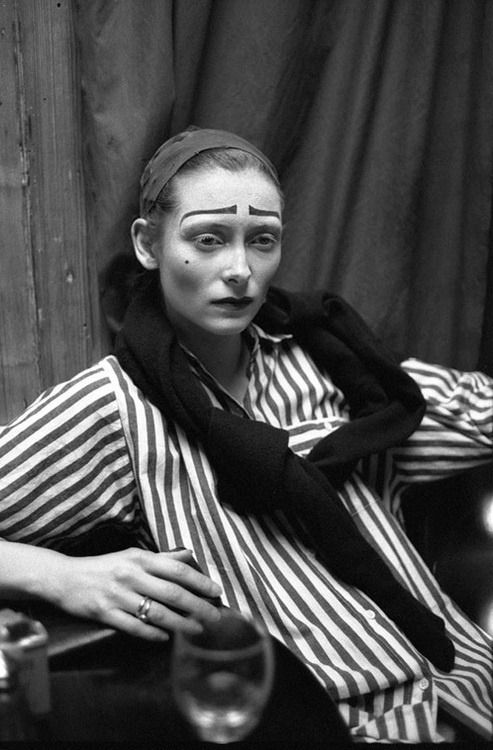
That girl: Tilda Swinton (via DeceitfulYouth)
Joanna Priestley's "Clam Bake" is an interactive treat for you iDevice.
Catch 'em while you can!
Two of the summer's most delightful little comedies are getting out of town before the Labor Day rush: "Bernie," Richard Linklater's lightly morbid tale of a real-life murder starring Jack Black and Shirley MacLaine, and "Your Sister's Sister," Lynn Shelton's tale of a muddled man finding himself romantically caught between two half-sisters, starring Mark Duplass, Emily Blunt and Rosemarie DeWitt.Everything old is new again!
"Boyz N the Hood" John Singleton's stirring depiction of life in South Central L. A., with Cuba Gooding Jr., Laurence Fishburne, Ice Cube and Morris Chestnut. (Laurelhurst)
Gent: Zimmy
An 'eat local' week is built, in part, on a selection of films about where our food comes from.
Even by the standards of Oregon they do things a little differently in the Rogue Valley. Witness the Food for Thought Film Festival, three nights of films about food and food resource management being held as part of Eat Local Week, a drive to get folks to feed on the bounty that grows around them.
We did some more redecorating yesterday. Whattayathink? #rctid
The director of "The French Connection" and "The Exorcist" is still capable of pushing us where we don't necessarily want to go.
Reviews of this week's new releases in Portland-area theaters.
A truly hectic week, as evidenced by the number of films to do with cars, bikes and travel. To wit: David Cronenberg's dark limo ride, "Cosmopolis"; the bike-messenger-on-the-run picture "Premium Rush"; and the darkly comic chase film "Hit and Run." We've also got reviews of the culture-clash comedy "2 Days in New York"; the exes-trying-to-stay-friends film "Celeste and Jesse Forever"; and the unbelievable but true crime story "The Imposter." Plus, like clockwork, "Also Opening," "Indie/Arthouse," "Levy's High Five" and (the newly renamed) "Vintage Views."The Portland filmmaker, who contented for Oscars last with "Milk," is back in the award season-mix.
Portland director Gus Van Sant's "Promised Land," a drama about a shady salesman trying to capture the drilling rights to an economically troubled Pennsylvania town, will be released by Focus Features on December 28. The film had originally been intended for a 2013 release, but the new date indicates that the distributors believe it can be a contender in the Oscar derby for the coming winter.The five films playing in Portland-area theaters that I'd soonest see again.
1) "Beasts of the Southern Wild" A dreamy and joyous film about life, death, hope, dreams and wonder on an island in the Mississippi Delta. The miraculous young Quevezhané Wallis stars as Hushpuppy, a wee girl who experiences life in the feral community known as the Bathtub as a stream of wonder and delight, even though her dad (Dwight Henry) is gruff, her mom is absent and a killer storm is bearing down on her home. Writer-director Behn Zeitlin, in his feature debut, combines poetry and audacity in ways that recall Terrence Malick, but with a light and spry touch. Still, all his great work pales in comparison to the stupendous little Wallis, whom you'll never forget. Hollywood, Living Room, Tigard
2) "Moonrise Kingdom" Wes Anderson films are such a specific taste that I'm a bit hesitant to suggest that this might be his most approachable (but surely not crowd-pleasing) work. In the wake of the delightful "The Fantastic Mr. Fox," Anderson returns to live-action and his familiar tics and habits in a tale of young (as in 'pre-teen') lovers on the run. Newcomers Jared Gilman and Kara Hayward fill the lead roles delightfully, and Anderson's muses Bill Murray and Jason Schwartzman are joined ably by Edward Norton, Bruce Willis and Frances McDormand, among others. It's a light and breezy film with a very sweet heart and old-fashioned sturdiness. Even if you were left puzzled by the likes of "Rushmore" or "The Royal Tenenbaums" (still his best non-animated films, for me), this is likely to win you over. multiple locations
3) "The Bourne Legacy" A dense, slick and thrilling spy movie that's got as much brain power as brawn. Writer-director Tony Gilroy ("Michael Clayton") turns the trilogy of films about Jason Bourne into the story of Aaron Cross (Jeremy Renner), another souped-up intelligence operative on the run from the secretive organizations which built him. The film cleverly integrates the story of the previous three, but stands alone as a gripping story about a man trying to extend the only life that he has come to know and depending on a geneticist (Rachel Weisz) and his own abilities to stay alive. From the complex narrative to the thrilling final half-hour, it's top shelf stuff. multiple locations
David Cronenberg's adaptation of a Don DeLillo novel is an exquisitely built torture machine -- for its protagonist and, perhaps, for its viewers.
A man poses as a missing boy, even though he's nothing like him, and pulls off the hoax with the boy's family.
Visiting relations turn a Manhattan couple's life into utter chaos, comically.
Joseph Gordon-Levitt is riding against the clock and a dirty cop in an energetic, if ordinary, thriller.
© 2025 Shawn Levy Dot Com
Theme by Anders Noren — Up ↑